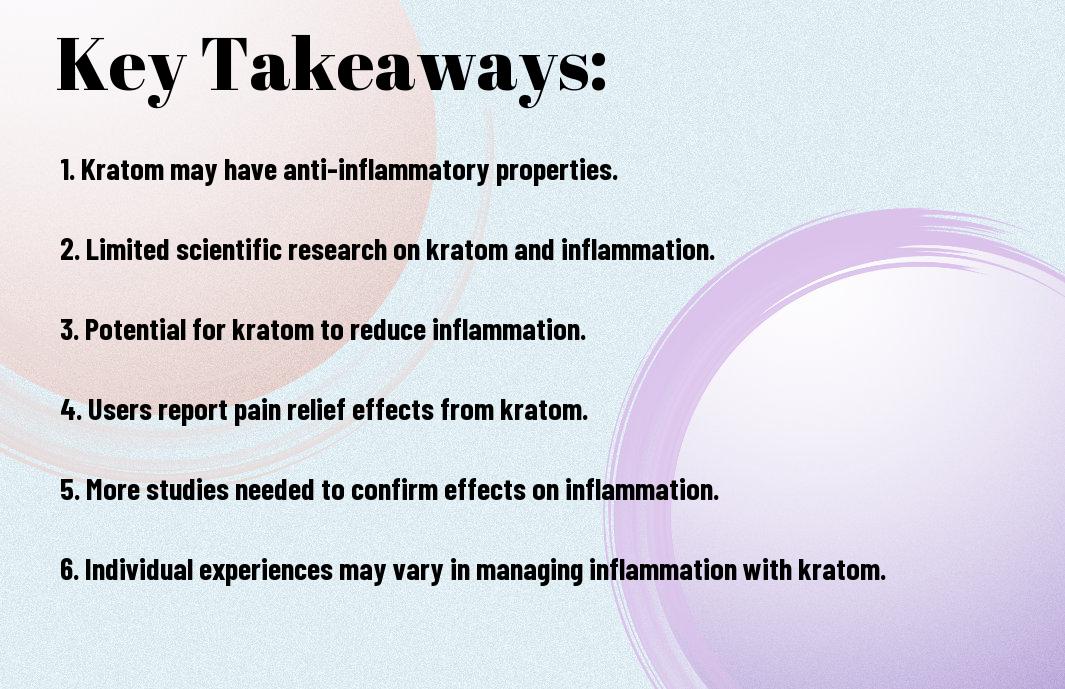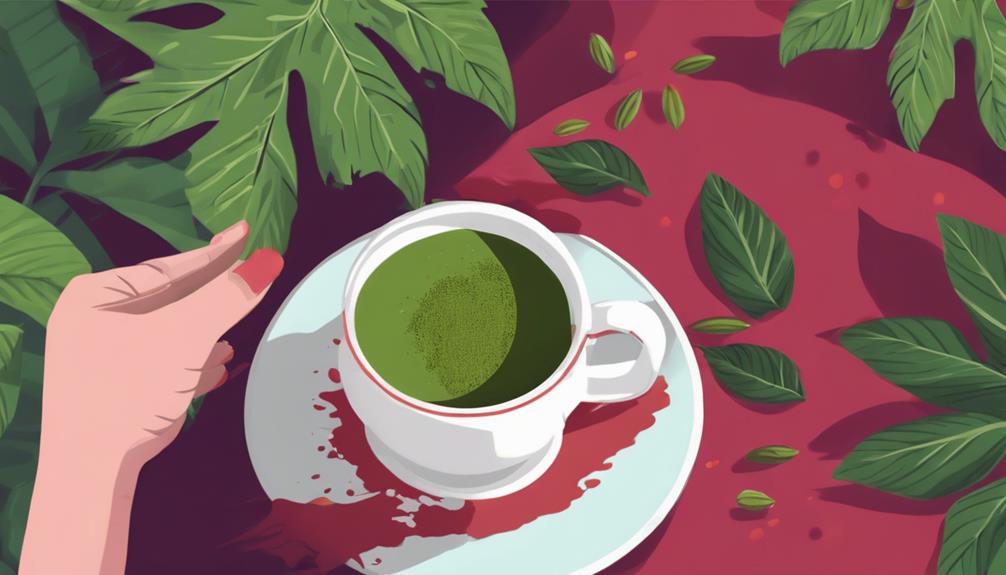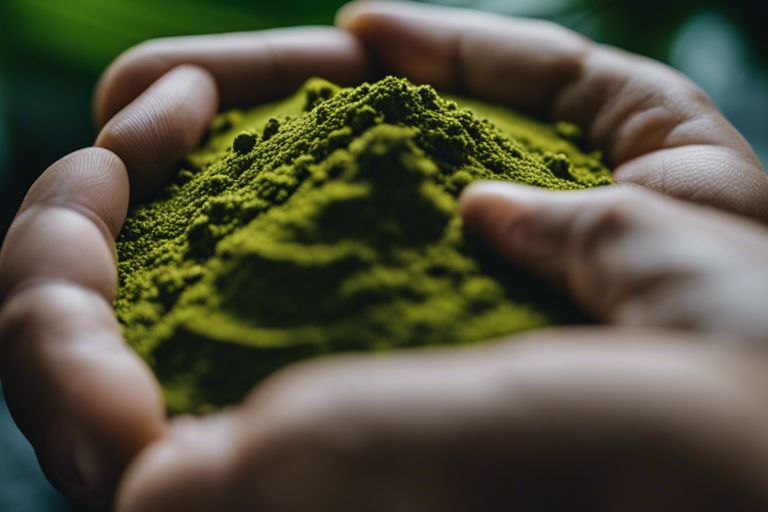Deprecated: mb_convert_encoding(): Handling HTML entities via mbstring is deprecated; use htmlspecialchars, htmlentities, or mb_encode_numericentity/mb_decode_numericentity instead in /home/users/kratomfiles/www/kratomfiles.com/wp-content/plugins/quick-adsense-reloaded/includes/template-functions.php on line 3552
Many are turning to kratom as a potential solution for managing inflammation. This plant-based substance has gained popularity for its reported analgesic and anti-inflammatory properties. In this article, we will explore the potential benefits of kratom in easing inflammation and discuss the research behind its effects on the body.
Key Takeaways:
- Kratom may have anti-inflammatory properties: Preliminary research suggests that kratom may help reduce inflammation in the body due to its alkaloids and compounds.
- It could potentially alleviate symptoms of inflammatory conditions: Some users report that kratom has helped them manage symptoms of conditions like arthritis, inflammatory bowel disease, and fibromyalgia.
- Individual results may vary: While some people may experience relief from inflammation-related issues with kratom, it’s important to note that individual responses can vary, and more research is needed to fully understand its effects.

What is Kratom?
To answer the question of whether kratom helps with inflammation, it’s important to understand what kratom is. Kratom, scientifically known as Mitragyna speciosa, is a tropical tree native to Southeast Asia, particularly in countries like Thailand, Malaysia, Indonesia, and Papua New Guinea. It belongs to the coffee family, Rubiaceae, and has been used for centuries for its medicinal and recreational properties.
Origin and History
What sets kratom apart is its rich cultural history in traditional medicine. In Southeast Asia, kratom leaves have been chewed or brewed into tea for their stimulant and pain-relieving effects. Workers would often use kratom to combat fatigue and enhance productivity during long hours of labor.
Chemical Composition
For centuries, kratom’s key components have been mitragynine and 7-hydroxymitragynine, two alkaloids that interact with opioid receptors in the brain. These alkaloids are responsible for kratom’s pain-relieving and sedative effects. Additionally, kratom contains over 40 other compounds, contributing to its diverse pharmacological profile.
With its opioid-like properties, kratom has garnered attention for its potential as an alternative to conventional pain management. However, the plant’s addictive nature and potential for abuse are areas of concern among healthcare professionals and regulatory bodies.
What is Inflammation?
If you are curious about what exactly inflammation is and how it impacts the body, a critical review of the neuropharmacological effects published in “A Critical Review of the Neuropharmacological Effects” sheds light on the subject. Inflammation is the body’s natural response to injury, infection, or irritation. It is a complex process that involves various cells and molecular mediators. Inflammation can be acute, meaning it occurs rapidly and is typically resolved in a timely manner, or chronic, which persists for a longer time and can lead to various health issues.
Definition and Causes
On a fundamental level, inflammation is the body’s defense mechanism against harmful stimuli, such as pathogens, damaged cells, or irritants. When the immune system recognizes these threats, it triggers a cascade of events to protect the body and promote healing. Common causes of inflammation include infections, physical injuries, autoimmune disorders, and exposure to toxins.
Types of Inflammation
Inflammation can manifest in different types, including acute and chronic forms. Acute inflammation is a short-term response that aims to eliminate the initial cause of cell injury, clear out necrotic cells and tissues damaged from the original insult, and initiate tissue repair. On the other hand, chronic inflammation involves a prolonged immune response that can persist for weeks, months, or even years. Any disruption in the inflammatory process can lead to chronic inflammatory conditions, such as arthritis, asthma, and inflammatory bowel diseases.
| Acute Inflammation | Chronic Inflammation |
| Short-term response | Prolonged immune response |
| Goal is to eliminate the cause of cell injury | Can persist for weeks, months, or years |
| Initiates tissue repair | Linked to chronic inflammatory conditions |
| Clears out damaged cells and tissues |
Effects on the Body
With inflammation being a crucial part of the body’s defense mechanisms, it can elicit various effects on the body. Acute inflammation typically results in redness, swelling, heat, pain, and loss of function in the affected area. Chronic inflammation, on the other hand, can lead to tissue damage and contribute to the development of various diseases, including cardiovascular conditions, diabetes, and cancer.
Understanding the different types and effects of inflammation is necessary for maintaining overall health and well-being. It highlights the significance of addressing inflammation promptly and effectively to prevent long-term complications. In some cases, natural remedies like kratom are being explored for their potential anti-inflammatory properties, offering a holistic approach to managing inflammation and promoting healing.
The Connection Between Kratom and Inflammation
Now, let’s research into the intriguing relationship between kratom and inflammation. Research suggests that kratom may indeed possess anti-inflammatory properties that could potentially offer relief for various inflammatory conditions.
Kratom’s Anti-Inflammatory Properties
An emerging body of evidence indicates that kratom contains compounds that exhibit anti-inflammatory effects. These compounds may help to reduce inflammation in the body, which is often at the root of many chronic health issues. By modulating inflammatory pathways, kratom could potentially offer a natural alternative for managing conditions linked to inflammation.
How Kratom Interacts with the Body
With its active alkaloids, kratom interacts with the body’s opioid receptors, among other mechanisms. This interaction can influence the release of neurotransmitters and impact various physiological processes, including inflammation regulation.
For instance, kratom’s alkaloids, such as mitragynine and 7-hydroxymitragynine, may target specific receptors involved in inflammatory responses, potentially leading to reduced inflammation in the body.
Potential Benefits for Inflammatory Conditions
Kratom’s potential anti-inflammatory properties suggest promising benefits for individuals dealing with conditions characterized by inflammation, such as arthritis, inflammatory bowel disease, or chronic pain. By targeting inflammatory pathways, kratom may offer a natural approach to alleviating symptoms and improving quality of life for those affected by these conditions.
Understanding the mechanisms through which kratom interacts with the body and its potential effects on inflammation is crucial for exploring its therapeutic potential in managing inflammatory conditions. Further research is needed to fully comprehend the extent of kratom’s anti-inflammatory properties and its implications for various health issues.
Scientific Evidence Supporting Kratom’s Anti-Inflammatory Effects
Keep
Studies on Kratom’s Analgesic Properties
AntiInflammatoryStudies have shown that kratom compounds possess analgesic properties that can help reduce pain and inflammation. Mitragynine and 7-hydroxymitragynine, two key alkaloids found in kratom, interact with opioid receptors in the brain to alleviate pain sensations. By modulating the body’s perception of pain, kratom can effectively reduce inflammation and discomfort in various conditions.
Research on Kratom’s Anti-Inflammatory Mechanisms
KratomsResearch on kratom’s anti-inflammatory mechanisms has suggested that the plant’s alkaloids may also impact inflammatory pathways in the body. Studies have indicated that kratom can inhibit the production of pro-inflammatory cytokines and enzymes, thereby reducing inflammation. Additionally, kratom’s antioxidant properties play a role in combating oxidative stress, which is closely linked to inflammatory processes in the body.
KratomsFurther research is needed to fully understand the specific mechanisms by which kratom exerts its anti-inflammatory effects. However, the current evidence suggests that kratom may offer a multifaceted approach to reducing inflammation by targeting various pathways in the body.
Clinical Trials and Results
MechanismsA growing body of research has explored the potential of kratom in managing inflammatory conditions such as arthritis, fibromyalgia, and inflammatory bowel disease. Initial findings from clinical trials have shown promising results, with participants reporting a reduction in pain and inflammation after using kratom-based interventions. These results suggest that kratom may hold significant therapeutic potential for individuals struggling with chronic inflammatory disorders.
AAs researchers research deeper into the mechanisms of kratom’s anti-inflammatory effects, there is hope that this natural remedy could offer a safe and effective alternative for individuals seeking relief from inflammatory conditions. Continued research and clinical trials will be crucial in establishing kratom’s role in modern healthcare and potentially unlocking its full therapeutic benefits.
Real-Life Examples of Kratom’s Inflammation Relief
Despite the ongoing debate surrounding kratom’s effects, many individuals have reported positive experiences with using the plant to alleviate inflammation and related symptoms. Real-life examples provide valuable insights into kratom’s potential benefits in managing inflammatory conditions.
User Testimonials and Reviews
Anecdotal evidence from users suggests that kratom may help reduce inflammation and provide relief from associated discomfort. Users have reported experiencing decreased pain and swelling after incorporating kratom into their wellness routines. While these testimonials are subjective and not scientifically proven, they offer a glimpse into how some individuals perceive kratom’s impact on inflammation.
Personal Stories of Kratom’s Impact on Inflammation
Any personal stories shared by individuals who have used kratom for inflammation can shed light on the plant’s potential efficacy. Individuals have described experiencing improved mobility, reduced stiffness, and overall relief from inflammatory symptoms after consuming kratom. These personal accounts contribute to the ongoing discussion about kratom’s role in managing inflammation.
Examples of anecdotal evidence highlighting kratom’s effectiveness in addressing inflammation can provide valuable insights for individuals considering alternative remedies. Personal stories and testimonials offer a glimpse into how kratom may impact inflammatory conditions, guiding those seeking natural solutions for managing discomfort.
Expert Opinions and Insights
Inflammation experts and researchers have differing views on kratom’s potential role in inflammation management. Some experts suggest that kratom’s alkaloids may have anti-inflammatory properties, while others caution against relying solely on kratom for treating chronic inflammation. Research into kratom’s effects on inflammatory pathways is ongoing, with experts emphasizing the need for further studies to elucidate the plant’s mechanisms of action.
Expert opinions on kratom’s impact on inflammation provide a nuanced perspective on the plant’s potential benefits and limitations. While some experts acknowledge kratom’s anecdotal benefits, others advocate for cautious exploration and scientific validation of its anti-inflammatory properties.

Is Kratom Effective in Treating Inflammation?
Kratom’s antiinflammation properties have been studied for its potential in treating inflammation. Some research suggests that certain compounds in kratom may help reduce inflammation and related symptoms. However, further studies are needed to fully understand kratom’s effectiveness in treating inflammation.
Can Kratom Help with Inflammation as Well as Chronic Pain?
Kratom is believed to provide natural relief for pain by helping to reduce inflammation and alleviate chronic pain. Many people use it as an alternative to pharmaceutical pain medications. Research on its effectiveness is ongoing, but some individuals report significant improvement in their pain symptoms after using kratom.
Potential Risks and Side Effects
Common Adverse Reactions to Kratom
Kratom is not without its risks and side effects. Some common adverse reactions to kratom include nausea, constipation, dizziness, and drowsiness. These symptoms are typically mild and transient, but in some cases, they can persist or worsen.
Interactions with Medications and Contraindications
Side effects of kratom can also include interactions with medications and contraindications. Kratom may interact with certain medications, such as antidepressants or stimulants, leading to potential health risks. Additionally, individuals with certain medical conditions, such as liver or kidney disease, should avoid kratom due to the potential for adverse effects.
It is crucial to consult with a healthcare professional before using kratom, especially if you are taking any medications or have underlying health concerns.
Safe Dosage and Usage Guidelines
Side effects of kratom can be minimized by following safe dosage and usage guidelines. It is imperative to start with a low dose and gradually increase as needed, while monitoring for any adverse reactions. Additionally, avoiding frequent and high-dose kratom use can help mitigate the risk of developing tolerance or dependence.
With its potential benefits for inflammation, it is important to approach kratom use with caution and awareness of its potential risks and side effects. Taking the necessary precautions and staying informed can help ensure a safer and more effective experience with kratom.
To wrap up
Ultimately, while there is anecdotal evidence and traditional use suggesting that kratom may help with inflammation, more research is needed to fully understand its effects on the body. As with any natural remedy, it is crucial to consult with a healthcare professional before incorporating kratom into your routine, especially if you are currently managing inflammatory conditions.
FAQ
Q: What is kratom?
A: Kratom is a tropical tree native to Southeast Asia. Its leaves have been used for centuries for their medicinal properties.
Q: Does kratom help with inflammation?
A: Yes, kratom has been shown to have anti-inflammatory properties that can help reduce inflammation in the body.
Q: How does kratom reduce inflammation?
A: Kratom contains alkaloids that interact with opioid receptors in the body, which can help reduce inflammation and alleviate pain.
Q: What are some other health benefits of kratom?
A: In addition to its anti-inflammatory properties, kratom has also been used to relieve pain, boost energy, improve mood, and reduce anxiety.
Q: Are there any risks or side effects associated with using kratom for inflammation?
A: While kratom can be effective in reducing inflammation, it is important to use it responsibly and in moderation to avoid potential side effects such as nausea, dizziness, and dependence.









